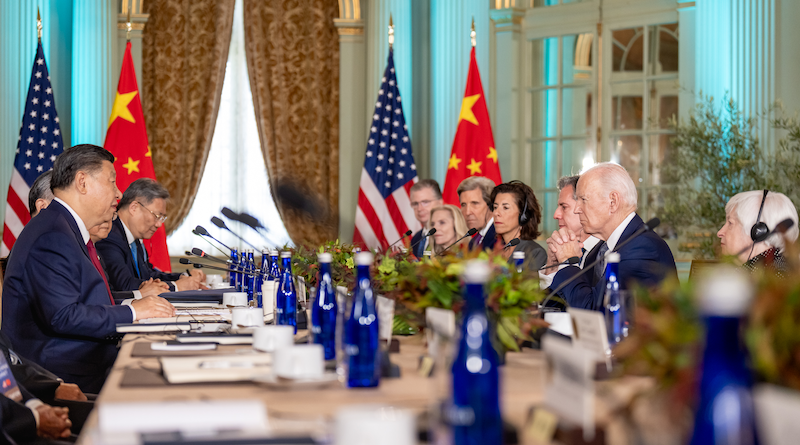Peace Superpower Vs. War Superpower: Will Beijing Win The Soft Power War Against Washington? – OpEd
By Greg Pence
The US became a superpower through the two world wars and the Soviet collapse. China emerged as a superpower in the post-Soviet peace era. For the US, war is an opportunity to achieve its goals. This is evident in its involvement in the conflicts between Ukraine and Russia, and Hamas and Israel. However, for China, war is a disruption to its and the world’s growth. This is why it prefers to end wars quickly. As a result, most of the world favors China’s thinking, while the US tries to gain an edge over China. Accordingly, the US views war as an opportunity to achieve its goals, while China views war as a disruption to its and the world’s growth.
The world is facing a crucial decision: to align with the United States or China. This is not a mere duality, but a reality that demands our attention. For decades, the United States was the undisputed global leader, imposing its interests and values on other nations. But now, a new superpower has risen: China, a country that offers a different vision and a different approach. China claims to be a champion of peace and cooperation, while the United States is seen as a source of conflict and domination. Which path will the world follow? And how will the United States react to this challenge? Will it accept the changing global order and share its power with China, or will it resist and fight for its supremacy? This is not a battle for land or resources but for hearts and minds. The stakes are high, and the time is now.
The United States has been involved in countless wars and conflicts throughout its short but turbulent history. From the wars of independence and civil war to the world wars and the wars in Vietnam, Yugoslavia, Afghanistan, and Iraq, the United States has shown its willingness to use force and violence to achieve its goals. And these are only the direct wars; if we add the proxy wars and indirect interventions, we see that the United States has rarely been at peace. The United States owes its superpower status to wars, and whenever it felt threatened or challenged by a rival, it resorted to the tools of war. The United States views the wars in Ukraine and Israel as opportunities to weaken Russia and China, and to reaffirm its dominance in the Middle East. The recent deployment of two warships to the region sends a clear message to the regional countries and China: the United States is the ultimate power in the Middle East, and it is ready to fight and win at any time.
China stands as a stark contrast to the United States, a superpower that emerged not from war, but from peace and stability after the war. China has a long history of avoiding war and aggression, and in modern times, it is regarded as a peaceful power. Beijing has always advocated for de-escalation and stability and has never supported any war. A recent example of China’s pacifism is its role in mediating between Riyadh and Tehran and easing the tensions between Saudi Arabia and Iran. China has also adopted a pacifist stance towards the war in Ukraine, and proposed a 12-point plan to resolve the conflict; a plan that was rejected by the United States. As for the war between Hamas and Israel, Beijing is trying to balance the Western world’s unconditional support for Israel, while avoiding inflammatory rhetoric and biased positions. Beijing has a good position to mediate, as it has friendly relations with both the Palestinian and Israeli sides.
The world is faced with a choice between two strategies: the American strategy of war and intervention, and the Chinese strategy of peace and cooperation. Many countries, including some of the United States’ old allies, have chosen China over the United States, because they value development and growth, and they recognize the need for stability and global cooperation to address common challenges. Moreover, many countries see the United States as a reminder of the colonial era and Western imperialism, while they find China’s empathy and neutrality appealing. Therefore, in the struggle for hearts and minds, China seems to have an edge over the United States, a situation that the United States is trying to reverse by vetoing China’s peace proposals in the UN Security Council and by displaying its power and creating obstacles for China’s influence. In other words, while most of the world is leaning towards China’s vision, the United States is trying to take away this soft advantage from China.

